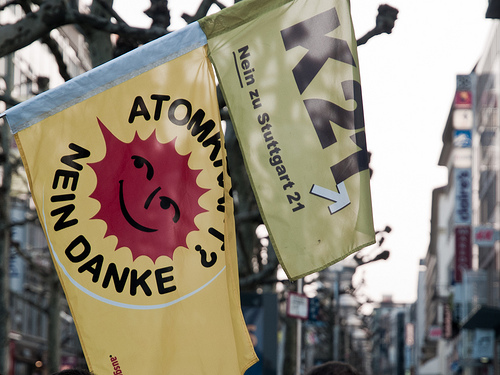Nuclear power? Nein, danke!Photo: Dan ZelazoCross-posted from The Hill.
Germany’s plans to phase out nuclear power seemed to catch many around the world by surprise and create a fair amount of skepticism. Some painted it as a “panicked overreaction” to the nuclear meltdown in Japan, and even as “environmental vandalism.”
One can argue that Germans are more risk-averse than other cultures. The Chernobyl accident in 1986 resulted in a radioactive cloud hanging over large parts of Europe for several weeks. It was a smart precaution to stay out of the rain and skip eating vegetables to avoid contamination. After experiencing this physical threat to personal health, Germans are more concerned about the risks of nuclear power than others might be.
The Fukushima accident not only confirmed this skepticism. It demonstrated the need for a new risk assessment: If a high-tech nation like Japan is not able to cope with a nuclear meltdown, why should Germany be? And why let a few corporations make all the profits when taxpayers are asked to pay billions for an accident in the end? With 80 million people in an area half the size of Texas, Germany is so densely populated that a nuclear disaster would turn into an economic catastrophe beyond imagination.
A decade ago, Germany started transitioning towards a low-carbon economy. The share of renewable power has tripled. Wind farms, solar modules, biogas, and hydro power provide 18 percent of Germany’s power supply. Today, renewables are a reliable and indispensable pillar of Germany’s power supply that keep trains running and factories humming. The sector is fast growing and provides 370,000 well-paying jobs — much more than the 22,000 jobs in Germany’s lignite coal industry. Many of these jobs are within traditional industries, such as steel, farming, and the ceramic and glass industries.
Critics argue that Germany will hurt its economy by raising energy costs, replacing nuclear power with imports from France, and building more coal plants, thus increasing carbon emissions. The facts do not bear this out.
First, Germany is able to supply its power needs on its own without nuclear. The country has been mostly a net exporter of power over the last decade. Depending on the time of day and year, households and industry consume 40,000 to 80,000 megawatts (MW) of power. Even if all 17 nuclear power stations were shut down at once, coal, gas, and renewables still provide a capacity of 81,000 MW.
Power is imported not out of a lack of supply, but as an economic decision to shop where prices are lowest. Though Germany is often importing electricity from France during the spring and fall, the relationship is reciprocal: In summer and winter, France is importing power from Germany. When temperatures rise and the water levels drop, river-cooled nuclear reactors have to reduce output or be shut down.
Second, the nuclear phaseout does not jeopardize Germany’s ambitious climate action efforts: reducing carbon emissions by 40 percent by 2020 and by at least 80 percent by 2050. By rules of the E.U. carbon market, emissions from the energy sector are capped. Even if coal were to replace nuclear capacity, emissions will have to be reduced within the entire sector, either by shifting to natural gas or by replacing old coal plants with more efficient ones.
Third, a shift to a renewable energy powered economy comes with costs. However, this price tag is modest in comparison to the heavy burden that nuclear brings. Over the last 40 years, the German nuclear industry has been pampered with more than 200 billion Euros ($281 billion) in subsidies. In comparison, renewable energy technologies have been incentivized by about 4.8 billion Euros ($6.7 billion) in 2010. By replacing fossil fuel imports and avoiding health costs, renewables already pay off today.
When the German Parliament passes the nuclear phaseout legislation in early July, it will be accompanied by seven other laws to accelerate investments in renewables and retrofitting of houses, to increase energy efficiency, to develop new storage technologies, and to improve the energy grid infrastructure. By 2020, Germany aims to supply its economy with at least 35 percent of renewable power, and 80 percent by mid-century.
Politics, too, played a role in the recent decision. Chancellor Angela Merkel used to be a strong proponent of nuclear. Her governing coalition has paid a high price for this. The Green Party has won one election after another. In the most recent state election, Merkel’s Conservative Party came in third behind the Greens. Her reversal on nuclear policy after Fukushima was driven by the understanding that most Germans across the political spectrum favor a phaseout as soon as possible.
Germany’s gradual nuclear phaseout is neither unique — Japan, Switzerland and Italy are following suit — nor a hysterical overreaction. It is yet another cornerstone in a comprehensive, long-term strategy of industrial modernization that turns the energy challenge into an economic opportunity. Saying “Auf Wiedersehen” to nuclear will accelerate the transition towards a low-carbon economy.



